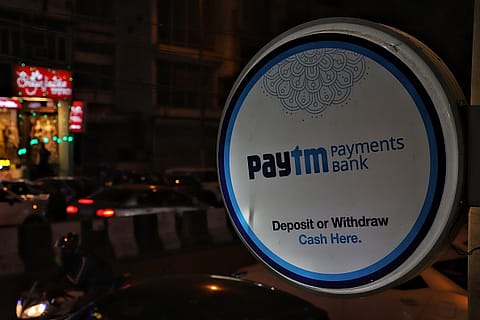Paytm shares rise 5% on partnership with Axis Bank; extension of deadline for PPBL
The fintech stock has lost 53% since January 31, 2023, while its market cap has fallen over ₹25,500 crore in the last 13 sessions.

Shares of Paytm hit 5% upper circuit limit for the second straight session amid a slew of positive developments. Amid an ongoing crisis due to restrictions imposed by the Reserve Bank of India (RBI) on its associate entity Paytm Payments Bank (PPBL), Paytm has decided to partner with Axis Bank to settle merchant payments. Besides, in partial relief to Paytm users, the RBI has extended the deadline for restrictions on deposit and credit transactions of PPBL by 15 days to March 15, from the earlier deadline of February 29.
Cheering the news, Paytm shares were locked in its upper circuit limit of 5% at ₹358.55 on the BSE, against the previous closing price of ₹325.25. The market capitalisation rose to ₹22,773 crore, with 0.5 lakh shares changing hands over the counter.
In the past 13 sessions, the share of Paytm has plunged nearly 53% from ₹761 at the close on January 31, 2023, after the RBI stopped PPBL from taking new customers with immediate effect, while barring the company from taking further deposits or credit transactions or top-ups in any customer accounts, prepaid instruments, wallets, FASTags, NCMC cards, etc. after February 29. The market capitalisation of the fintech company has dropped more than ₹25,500 crore from ₹48,336 as of January 31, 2024.
In an exchange filing on February 17, Paytm parent One 97 Communications (OCL) partnered with private lender Axis Bank for escrow account to continue seamless merchant settlements. This will ensure continuity of settlements for merchants and minimal disruption for customers, via a new account with Axis Bank. PPSL has already been using Axis Bank services since its inception.
“This arrangement is expected to seamlessly replace the nodal account that OCL was using with Paytm Payments Bank,” the filing read.
As per the release, both OCL and PPSL are also in discussions with other banks to evaluate a second partner for nodal or escrow services. Consumer payments for merchant transactions are typically collected in a dedicated account. This arrangement enables Paytm to transition its merchants’ settlements to Axis Bank, thereby facilitating business operations for the merchants.
In a separate development, the RBI last Friday extended the deadline for restrictions on services of PPBL to March 15, keeping in view the interest of customers (including merchants) of PPBL, who may require a "little more time" to make alternative arrangements. The central bank also released a list of Frequently Asked Questions (FAQs) for the convenience of Paytm Bank customers and the general public.
The RBI in its FAQs said that merchants can accept payments using Paytm QR code, soundbox or point of sale (PoS) terminal even after March 15, if the receipt or transfer of funds are linked to any banks other than PPBL. However, merchants cannot transact after March 15 if the QR code, PoS, and sound box are linked to PPBL.
"No further deposits or credit transactions or top-ups shall be allowed in any customer accounts, prepaid instruments, wallets, FASTags, National Common Mobility Cards, etc. after March 15, 2024 (extended from the earlier stipulated timeline of February 29, 2024), other than any interest, cashback, sweep in from partner banks or refunds which may be credited anytime," the central bank says in the updated directive.
The RBI on January 31, 2024, stopped PPBL from on-boarding new customers and barred the company from taking further deposits or credit transactions or top-ups in any customer accounts, prepaid instruments, wallets, FASTags, NCMC cards, etc. after February 29. In a corrective measure, the board of One 97 Communications has formed a group advisory committee chaired by former SEBI chairman M Damodaran, to work with it in further strengthening compliance, and regulatory matters.
(DISCLAIMER: The views and opinions expressed by investment experts on fortuneindia.com are either their own or of their organisations, but not necessarily that of fortuneindia.com and its editorial team. Readers are advised to consult certified experts before taking investment decisions.)
(INR CR)